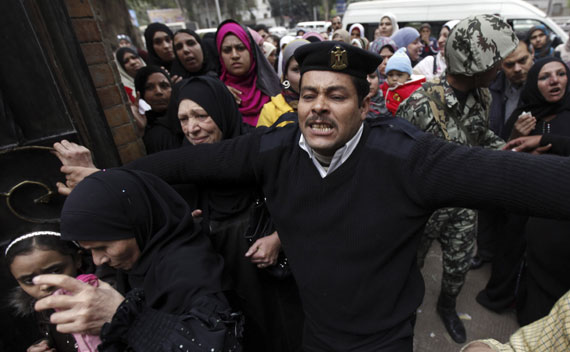Fear and Loathing in Cairo
More on:

In the midst of Egypt’s first post-Mubarak elections a certain sense of disbelief has set in among some Cairenes. Of course, this being Egypt, it comes with a sense of humor. The best quip of my few days here came when the driver that Marc Lynch and I hired to drive us to polling places and out of the way meetings jibed, “Last year the people now winning elections were terrorists and the people winning elections last year are now terrorists.” He was referring to the strong showing of both the Salafis and the Muslim Brotherhood’s party, Freedom and Justice, which together may control as much as three-quarters of the People’s Assembly.
After a summer and early fall of speculation, the only guess that anyone got right was the performance of the Brothers. It was believed almost universally among journalists, intellectuals, and a variety of others that the remnants of the NDP—the “felool” as they are known—would do well in the elections because they had a network, resources, and organization. It makes sense, but despite some former NDP members on the Wafd and the Egyptian Bloc lists, the Hizb al-Ittihad, which is most closely associated with the former ruling party, did poorly. The liberals haven’t done as well as they would have liked, especially the Free Egyptians who have the backing of gazillionaire Naguib Sawiris, though the party and its partners in the Egyptian Bloc—the Tagammu and the Egyptian Social Democrats—will likely garner somewhere in the low teens when all is said and done. Not bad for a party that did not exist ten months ago.
Still, the Egyptian liberals are stunned not so much by the Muslim Brothers who are now in a position to drive Egyptian politics, but the Salafis. Indeed, given the world in which many Egyptian liberals exist, they can’t seem to fathom where the Salafis come from so they complain about Saudi money and the manipulations of Habeeb al Adly’s Interior Ministry in the late Mubarak era, but I have news for them, they come from Egypt. It’s the same dynamic as when New Yorkers, for example, woke up on November 3, 2004 to learn that George W. Bush had been re-elected. Like everyone on the 6 train that morning who was feeling alienated from the rest of the United States, the denizens of La Bodega and the Marriott garden are collectively asking, “Who are these people?”
So far rounds I and II have revealed that money and organization are pretty overrated. The Brothers certainly have both and there are allegations that the Salafists have foreign funding, but they have the most important thing: a vision for society that makes sense to people. This is what the liberals are lacking. Egyptian liberals voted for themselves because they want to preserve a way of life, but it is not a formula for success in a political environment where they are a demonstrable minority. There seems to be some innate understanding of this, but it comes off in a clumsy way. In that John Kerry-esque, “Who among us does not like NASCAR?” way, the Egyptian Bloc ran an ad featuring some of their leaders declaring to be good Muslims. They may be, but in the battle of good Muslim-ness, the Brothers and Salafis win every single time. I also heard some liberals talk about emulating the way in which the Brothers have offered social services to Egyptians in need. This has been an important mechanism of political mobilization for the Brotherhood and it might even garner Egyptian liberals some more votes the next time, but again, what you stand for is ultimately the most important factor in an environment where people want a sense of hope and direction after the brutality and drift of the Mubarak years.
What Egyptian liberals stand for is up to them, but it seems to me they have to stop talking about secularism—which has a negative connotation in Arabic—and separation of religion and state. It is just not a winning argument. If it were me, I would build a vision around the three issues that have animated the Egyptian political arena for the better part of the last century: social justice, nationalism, and democracy. That’s what the January 25th uprising was all about, which seems to be a far better place to start than, “I really am a good Muslim too…..”
More on:
 Online Store
Online Store